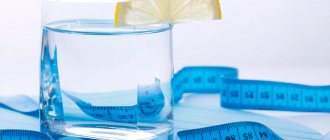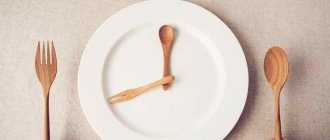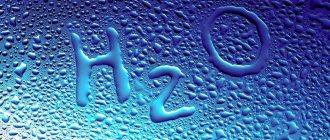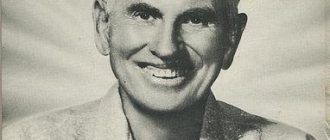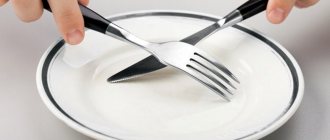When we need to lose weight, we go on a diet. And when it is necessary to cleanse the body, we think about therapeutic fasting. Today we will consider in detail the question of how to properly carry out therapeutic fasting on your own. After all, in fact Fasting is not a way to lose weight. There are easier ways to do this. Fasting is a process that requires a responsible approach. You can’t just start it because you have nothing to do. And if you finally decide that you need it, let’s consider the whole process in detail.
General information
For those who are interested in what therapeutic fasting is, Wikipedia says that it is a method of alternative medicine, the essence of which is a complete refusal of food.
And in some cases, from water. This is followed by a period of light, that is, dietary nutrition. Such an event is actually practiced by many people for different purposes. Some people decide to fast in order to lose weight. It is also practiced by those whose goal is to cleanse the body of waste and toxins , although the same Wikipedia points out the unscientific idea of the existence of waste in the body. However, this method is also prescribed by doctors to treat a number of diseases and eliminate certain conditions of the body.
However, this process is not simple, and it must be practiced correctly, taking into account all the contraindications and features of the procedure. Myths and reality about therapeutic fasting, as well as how to fast properly for health, are described in this article.
How to avoid going hungry
When refusing food, many experience not only hunger, but also weakness, decreased physical strength, etc. In this regard, there is a high risk of breaking from proper fasting and completing the procedure ahead of time. To prevent this from happening, remember the motivation that prompted you to use this technique. Drinking plenty of water will help you avoid feeling hungry. Walking, reading, music will help you switch from thoughts about food - there should be a frequent change of activity. Some practitioners do breathing exercises. Don't get overtired.
Methods of therapeutic fasting
There are several different methods of conducting therapeutic fasting, differing from each other.
- Complete fasting - with this system, a person completely abstains from food, but drinks water in unlimited quantities. It is also called "water".
- Absolute fasting involves abstaining from both food and water. It is also called "dry". It is not carried out longer than 1-2 days, since a longer period of abstinence from food leads to dehydration.
- Combined - in the first few days (preferably no more than two), abstinence from water and food is practiced. Then you can resume drinking water.
In turn, “dry” fasting is divided into:
- Partial “dry” - in this case, baths, showers, and douches are carried out in order to cleanse through the skin.
- Completely “dry” - there is no contact with water.
“Water” fasting is divided into:
- Short (up to 2 days).
- Medium (3-7 stock).
- Long-term (8-40 days).
The third stage comes when everything unnecessary and ballast in the body has already been “burnt”
And the body has to get energy by eating healthy cells in those body systems that have little effect on survival as a whole. At this stage, muscle mass begins to decrease, for example. We do not recommend taking it to this stage!
The last stage is destructive.
In this case, vital tissues and organs begin to be thrown into the firebox. As a result, the person dies. The exception is observed among highly spiritual people who simply no longer need food.
For what diseases should you not practice fasting?
There are a number of contraindications for such a procedure, since it is quite stressful for the body. Therefore, health fasting cannot be practiced in the following cases:
- severe lack of body weight;
- active tuberculosis
- malignant formations;
- diseases of the circulatory system;
- bronchiectasis;
- thyrotoxicosis;
- diabetes mellitus type I;
- renal failure;
- liver cirrhosis , chronic hepatitis
- heart diseases;
- thrombophlebitis;
- period after myocardial infarction .
Why practice fasting?
Sources that detail the benefits of fasting provide a lot of information about why you should fast. According to supporters of this method, stopping food intake leads to significant positive changes in the body.
In particular, it is indicated that abstaining from food has a positive effect on health and helps with allergic processes, asthma , skin diseases, as well as ailments of the heart, joints, spine, etc. There is an opinion that periodic abstinence from food can even be an effective prevention of cancer. It helps get rid of some chronic diseases and makes it possible to achieve self-healing of the body. In addition, fasting has a positive effect on a person’s mental state.
It is believed that regular abstinence from food improves vision. Some proponents of fasting even claim that it can improve myasthenia gravis .
For some diseases, hunger is indicated, and doctors confirm this. For example, there is a positive effect on the pancreas of a fasting diet. For pancreatitis , doctors prescribe abstinence from food for several days.
A one-day fasting diet is indicated for acute gastritis , enterocolitis , inflammation of the gallbladder, rheumatoid arthritis , gout , etc.
Abstaining from food is prescribed for the treatment of psoriasis , as it has a positive effect on the skin and improves immunity .
Finally, there is an opinion that periodic fasting is effective even for men who have impaired potency , as it exacerbates sexual desire. Even to treat Peyronie's disease (curvature of the penis), some proponents of fasting suggest practicing a fasting diet.
Not only individual supporters speak about the benefits of this method. The so-called fasting-dietary therapy, which is what fasting was called in medicine during the Soviet period, was officially recommended for use for treatment. And in modern medicine, this technique is also used both in our country and abroad. In many clinics and sanatoriums, patients undergo courses of therapeutic fasting. And modern scientists continue to study the action of this method and its effectiveness.
However, many people still find it difficult to understand how this technique affects the body and why modern people need medical fasting.
Proponents of this method argue that it is precisely modern people, whose health is negatively affected by a lot of factors every day, who need to periodically refuse food. After all, the consequences of poor ecology, poor nutrition and overeating, stress and other negative influences cannot be eliminated by taking a course of pills. Fasting allows the body to cleanse itself, reboot, and later eat more healthily.
After all, if a person does not eat for a certain period of time, then even after this process is over, he approaches nutrition differently. The way out of fasting involves eating plant foods for a certain period. And later the person switches to a healthier diet, especially if he fasts regularly. Therefore, therapeutic fasting at home or in sanatoriums allows you to gradually switch to proper healthy eating and overcome food addictions.
Fasting is recommended not only for the sake of health, but also in order to get rid of obesity . It is quite natural that during abstinence from food, the body burns excess fat. In addition, with regular periods of hunger, metabolism returns to normal, which helps to get rid of excess weight and a number of diseases.
Proponents of fasting also argue about the process of cleansing the body that occurs when a person does not eat. It is abstinence from food that is called the most physiological and effective way of cleansing.
There is also an opinion that regular periods of hunger help the body cope with constant stress. This is explained by the fact that in the process of abstaining from food, a person focuses precisely on this action and disconnects from the realities that provoke stress. The period of hunger is a kind of “vacation” from reality for the psyche, which subsequently has a positive effect on the general condition. True, at first a person may still feel certain unpleasant symptoms, but as he gets used to periods of hunger, the brain will “learn” to rest and distance itself from troubles.
So, summing up the above, we can note the following positive effects of periodic fasting on the body:
- allows you to overcome overeating;
- allows you to lose weight;
- has a positive effect on the liver;
- has a positive effect on those for whom allergies ;
- cleanses the body;
- allows you to effectively deal with stress and their consequences, normalizing the psychological state;
- helps treat diseases and is an effective method of preventing them.
Benefits and harm to the body
Let's talk about the benefits of fasting:
- Respite for the gastrointestinal tract. Due to the abundance of food, a person often does not control his appetite. Overeating often occurs, so rest for the digestive system is also necessary.
- Metabolic restructuring. During a hunger strike, the body uses up its own internal energy reserves. Fat reserves begin to decrease, which leads to weight loss.
- Longevity. The rejuvenation effect is achieved through the effects of hunger at the cellular and molecular levels.
- Cure various diseases, the list of which we provided above.
It turns out that the technique is useful for weight loss, rejuvenation and healing. But, do not forget about the other side of the coin.
Flaws:
- The risk of muscle loss increases. During a hunger strike, the body does not immediately begin to break down fats. Glucose and proteins are the first to be shot. Long-term refusal of food leads to muscular dystrophy.
- Poisoning with ketone bodies - fat breakdown products. With a lack of food, the level of glucose in the blood decreases - a lack of insulin develops. Fats cannot undergo complete oxidation under such conditions. This is how acidosis occurs, the main symptom of which is the smell of acetone from the oral cavity. In this case, we can talk about increasing intoxication.
- Appetite disorders. Long-term refusal of food results in the appearance of an uncontrollable feeling of hunger. It becomes difficult for a person to control his appetite, and regular overeating begins.
- Modern doctors argue about the accumulation of toxins. They claim that the lymphatic, urinary and circulatory systems cope with their own functions without any additional techniques.
How to fast properly?
In order for fasting treatment at home to be as effective as possible and not lead to undesirable consequences, you need to clearly know and strictly follow important recommendations.
Where to start preparing?
First of all, you should strictly adhere to the timing of fasting: at home it can last no more than 5 days. You can repeat short-term abstinence from food after 2-4 weeks. Longer periods of fasting should only occur under medical supervision.
The preparatory period is important. Before starting practice, a person must familiarize himself with the theory and understand the essence of this method. During preparation, it is worth carrying out certain cleaning procedures. It is recommended to cleanse the intestines, but this should not be done immediately before fasting, but about a month before. In about a week, you should adjust your diet by giving up heavy food and alcohol. The menu at this time should be dominated by dairy and plant foods. This preliminary diet will help reduce the feeling of hunger and make it easier to adapt to the lack of food.
For the first periods of hunger, you need to choose the optimal period. A healing one-day abstinence from food can be done at any time. But it is better to plan a longer famine for the end of summer - beginning of autumn. This is due to the fact that during this period there is a lot of fresh vegetables and fruits. In addition, a person can spend a lot of time in the fresh air.
The rules listed below are very important to follow during the period of therapeutic fasting:
- Do not practice heavy physical work during this time.
- Avoid hypothermia, try to keep your body warm.
- Rest often.
- Drink at least 2 liters of water per day.
Many beginners often write to some thematic forum asking whether, during abstinence from food, they will be bothered by an unbearable feeling of hunger. But in fact, this feeling only bothers you at first, and then it disappears. Gradually, a feeling of lightness appears, all senses become more acute, and memory becomes sharper.
In some cases, dizziness and weakness may bother you, but these phenomena also pass quickly.
Some people noted that during the period of abstinence from food they developed an aversion to food. However, after breaking the fast, the appetite was restored.
What can you eat during a period of hunger?
Even though fasting involves complete abstinence from food, many people still ask about what they can eat during this period. The fact that hunger must be complete is very difficult for many to accept. But the main rule of therapeutic fasting is exactly this. That is, during this period you cannot drink any drinks other than pure water. It is even forbidden to chew chewing gum or consume vitamins and nutritional supplements.
As for medications, their consumption should be under the supervision of a doctor. People with diseases whose treatment requires constant use of honey. medications, should not fast at home - this is only possible under the supervision of a doctor.
Water is the only drink allowed. Spring, distilled, melt, and boiled water are suitable. The most important thing is that it is clean. A person must determine the amount of liquid individually. But it is recommended to consume about 2 liters. Beginners can drink more to make it easier to endure the period of hunger. If it is very difficult to tolerate, it is permissible to drink a glass of water with half a teaspoon of honey diluted in it once a day.
Homemade therapeutic fasting: reviews and results
One of the most important advantages of this method of healing is the ability to practice it at home, strictly following the recommendations.
Reviews of fasting treatment confirm that a person can “learn” to fast very quickly. At the same time, many people, after several stages, write positive reviews that “fasting cured me of psoriasis and other diseases.” However, it is important to realize that the positive effects of this method are observed only if all the rules are followed.
When familiarizing yourself with the relevant literature, you need to take into account that different authors may describe fundamentally different systems of fasting recovery. For example, not everyone can withstand the so-called fasting according to Suvorin, because Alexey Suvorin describes a method of 40-day abstinence from food.
But fasting according to Breuss involves taking juices, herbal infusions and abstaining from food. People who have been drinking juice for 42 days also note the positive impact of this method on health.
But for beginners, it is better to practice short-term home fasting. Before that, you should read the opinions and reviews of those who already practice this technique.
Therapeutic fasting: before and after photos
Numerous photos before and after the process of abstaining from food confirm that this technique not only helps to overcome health problems, but also helps to lose weight. Those who regularly practice such periods have managed to get rid of an impressive amount of excess weight and overcome obesity .
However, in order for fasting at home to be as successful and safe as possible for health, it is necessary to master this technique gradually. That is, fasting at home is possible only if a person consciously strives to practice this method, knows enough about it and does not suffer from chronic illnesses.
Difficulties during fasting
Despite many positive reviews, it is important to tune in to the fact that hunger causes certain discomfort. In the first days, you may experience discomfort in the stomach, headaches and dizziness, and a strong appetite. Mood may worsen, irritability and weakness may appear. Different people experience these sensations with different intensities. But it is most difficult for beginners.
However, over time, these symptoms become less and less pronounced, and the person adapts to regular “sessions” of hunger.
The greatest human dream is health and long life!
A person feels at home in this world, and would like to live here forever, if he is healthy and full of youthful strength. Life itself is a miracle. And this miracle is in our hands.
Since the time of Adam and Eve in the Garden of Eden, prolonging human life has remained the most important issue. Persian and Greek sages, many centuries before Christianity, tried to resolve it, but to no avail. And today all serious minds are looking for a solution to this riddle.
It is impossible to avoid death, but every person, following the rules of hygiene and diet, can live to an old age. This can be achieved only by taking care of your body and extending life to normal limits - at least up to 120 years. But, unfortunately, a person, due to his shameless intemperance in food and drink, dies without living even half the time allotted to him.
Of the many biological species, only man does not live up to his natural limit. Animals instinctively feel what kind of life they should lead, what to eat, what to drink. When they are sick or injured, they usually go hungry. Instinct forces animals to eat what is good for them, and man consumes the most difficult to digest food, washing it down with poisonous drinks and then wonders why he does not live a hundred years! In theory, we all crave a long life, but in practice we reduce our lives to a minimum.
It turns out that there is a way not only to improve your body’s health, but also to return it to its original youth, and with it happiness and joy of life.
The secret of health and longevity can be formulated in three words: “Cleanse your body.”
Breaking out of fasting
It is very important not only to fast correctly, but also to gradually and in compliance with all the rules get out of this state. There are a number of important rules that must be followed during the exit process:
- observe the principle of fractional nutrition;
- increase the amount of food gradually;
- at first, eat mainly plant and dairy foods;
- The duration of the exit should be at least half the duration of the hunger period.
The first foods that can be consumed after the end of the fasting period are juices - vegetable and fruit. Initially they are drunk diluted. You need to take the juice in small portions, every two hours. Its quantity should be gradually increased. Gradually, vegetable broths, soups, fruits, and salads are introduced into the diet. But meat should not be included in the menu for as long as possible. Gradually, the number of meals per day is reduced to four.
- On the first day after a one-day fast, in addition to juices, you can eat cabbage salad with carrots. On the second day, vegetable stew, tea, and lactic acid products are introduced into the menu. Then you can eat as usual.
- After a three-day fast, a plant-milk diet is practiced for 3 days.
- After a fast of five to seven days, on the first day only juice diluted with water by half is consumed. By the end of the day, the concentration of juice should be increased. On the second day after lunch, you can already eat grated vegetables and fruits. On the third day, bread, cereals, and dried fruits are introduced. Next, vegetarian soups, fermented milk products, and sunflower oil are gradually introduced. In general, the recovery period lasts seven days.
It is important to take into account that during the period of abstinence from food, a person may experience weakness, dizziness, and loss of strength. This is how the body gradually transitions to normal nutrition.
What happens if you eat too much protein?
Protein-rich foods contain vital amino acids necessary for the synthesis of various enzymes and the formation of muscle mass. Amino acids are necessary for all plants and animals, therefore they are present in all food sources. Plants are able to produce amino acids with the help of sunlight and water, but animals (including humans) can only produce some of them. Therefore, we need to get additional amino acids from food.
You can enjoy all kinds of high quality protein sources. Some of the highest protein foods include meat and poultry, fish, seafood, beans and peas, eggs, soy, nuts and seeds. Leafy green vegetables and dairy products also contain proteins.
Is it possible to eat too much protein? Yes. Practice shows that the daily protein intake should be 0.8 grams per kilogram of body weight. It turns out that a person who weighs 70 kilograms needs approximately 60 grams of protein per day.
Take a close look at this recommendation and it becomes clear: most of us eat a lot of protein. However, too much protein (more than 2 grams per kilogram of body weight per day over several weeks or months) puts stress on the metabolic system and can damage the kidneys, and you obviously want to live your life with two working kidneys.
Protein shakes are good for building and maintaining muscle mass, especially if you need additional strength support during exercise. However, they may also contain many ingredients that should be avoided. For example, one serving of a shake may contain 15 grams of protein and 10 grams of sugar, which makes it palatable. If you feel like you need a protein shake, choose one that doesn't have any added sugar.

conclusions
Thus, therapeutic fasting is one of the methods for the prevention and treatment of a number of diseases. However, it is better to consult a doctor about which diseases can be cured and how to do it correctly. At home, you can practice only short periods of fasting, while strictly adhering to all the rules and recommendations of specialists.
Only in this case will this method help you get rid of a number of unpleasant sensations, lose weight and feel light and energized. In addition, it is important to be prepared for the fact that fasting may not be too easy to bear at first. However, the discomfort goes away if you practice such periods regularly and start them with a one-day fast on water.

